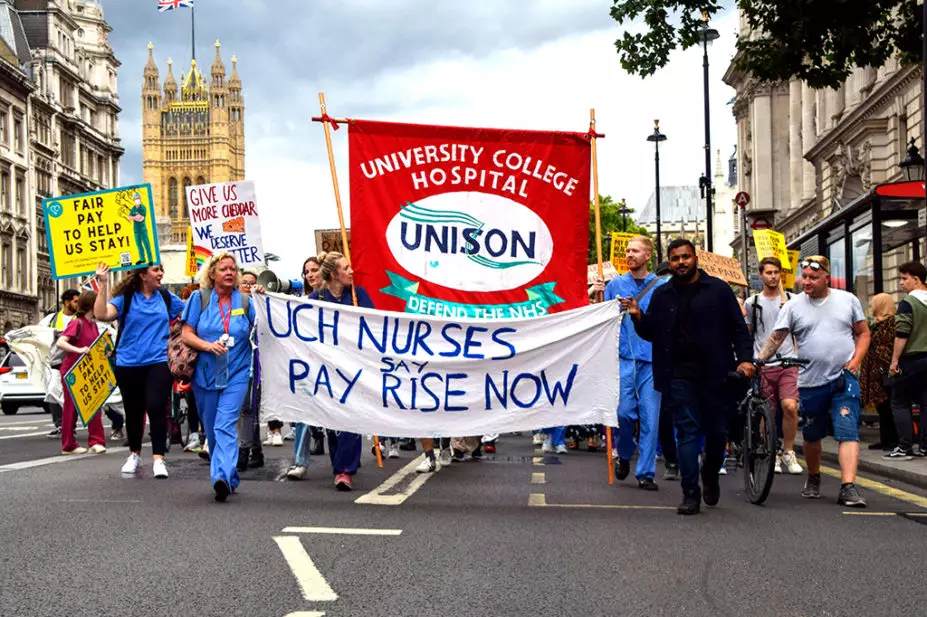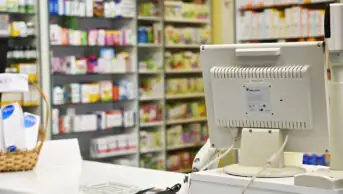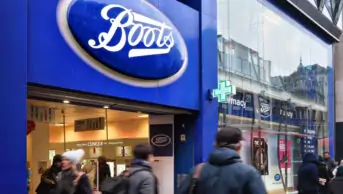
Vuk Valcic / Alamy Stock Photo
It is hardly surprising that after years of below-inflation pay rises, after working through a pandemic and amid a ‘cost of living’ crisis, NHS staff are getting serious about demanding more.
It was confirmed on 9 November 2022 that nurses have voted to take part in industrial action organised by the Royal College of Nursing over their pay and a ballot of ambulance workers in England is ongoing by the Unite union. But where this leaves the pharmacy profession is unclear.
Here, The Pharmaceutical Journal unpacks the latest on the pay rise for NHS staff, and how close the pharmacy profession is to potential industrial action.
What is happening with NHS pay?
The independent NHS Pay Review Body (NHSPRB) — made up of directors from a range of professions — advises UK governments on annual pay increases for NHS staff, although ministers do not have to abide by its recommendations.
In July 2022, the NHSPRB recommended a pay award of at least £1,400 for staff across England, Wales and Northern Ireland backdated to 1 April 2022. This equated to an increase in the pay bill of 4.8%.
The recommendation was accepted by the English and Welsh governments, much to the dismay of unions who described it as “very disappointing” and a real-terms pay cut for staff, owing to the fact that inflation was around 9% in July 2022.
However, Robin Swann, the Northern Irish health minister said he was “unable to announce the immediate implementation of these pay awards locally” because Northern Ireland has an agreed executive budget for 2022/2023.
The Scottish government opted for a different approach. Instead of requesting advice from the NHSPRB, it has been negotiating directly with trade unions. In June 2022, the Scottish government offered NHS Agenda for Change staff a 5% pay rise, which it said was “the largest single year increase since devolution”.
However, this pay offer was rejected by 89% of NHS Scotland staff in August 2022, including hospital pharmacists, in a ‘consultative ballot’ by the union Unite. This led to further negotiations and a new pay rise offer of £2,205 in October 2022, an average 7% uplift. Nevertheless, trade unions are once again balloting NHS staff, saying that this latest offer should be rejected because it leaves staff on higher pay bands with an even smaller uplift compared with the previous 5% offer.
On 25 November 2022, the Scottish government submitted an offer of a 7.5% average pay rise, which Unite will put to its members in a “consultative ballot”.
What are unions doing about this?
Following the action in Scotland, trade unions have advised NHS England that they are officially “in dispute” over the pay award for 2022/2023.
Unite is in the process of coordinating UK-wide strike action, which the union says “will see our members balloted strategically, in phases for industrial action over pay”.
Unite’s strategy in England has been informed by a ‘consultative ballot’ of 100,000 staff at NHS organisations that use the Agenda for Change scheme, which included hospital pharmacists. Some 84% of those balloted voted in favour of industrial action, while 97% said the pay award was unfair.
Following these results, Unite opened an official ballot on industrial action for ambulance workers in England that will close on 30 November 2022, although it will need a high turnout to succeed. Under the Trade Union and Labour Relations (Consolidation) Act 1992, all industrial action ballots must reach a 50% turn out with a majority voting in favour of strike action. For members in “important public services”, such as the ambulance service, 50% must turn out and vote, with at least 40% of all those entitled to vote voting in favour.
“We want to make sure we get as many of our members over the strict balloting thresholds, so that we maximise our impact and win,” Unite says on its website.
“We believe that by targeting our resources in workplaces with strong membership density and in areas where we will have impact, we can deliver.”
I don’t believe for a second that the the majority of the workforce is happy with a real-terms pay cut
Nathan Burley, president of the Guild of Healthcare Pharmacists
The Scottish Ambulance Service is also being targeted by Unite for an industrial action ballot, which is due to close on 4 November 2022 after a nationwide consultative ballot revealed 77% of NHS staff members indicated that they would be prepared to take industrial action over the government’s 5% pay offer.
However, unions are reconsulting with their membership following October’s updated £2,205 uplift offer. Unison, for example, which also represents NHS staff, suspended its industrial action ballot in light of the government’s new offer, and send out a new ballot on 31 October 2022.
In Wales, Unite has yet to start targeted balloting. But 70% of Unite NHS Wales members voted for strike action in the national consultative ballot, with 89% voting for action short of a strike.
Nurses who are members of the RCN have voted to take strike action, in support of a 5% pay rise above inflation, and industrial action is planned to take place at NHS trusts that have met the legal requirement in terms of turnout.
How close is industrial action for NHS pharmacists?
This is still unclear. Unite says that any action taken by ambulance workers will be followed by a ballot of “Unite members on Agenda for Change contracts in targeted NHS trusts, workplaces and professions, in England where workplace representatives can demonstrate they are more likely to achieve strict industrial action balloting turnouts from the results of the consultative ballot”.
This ballot will run from 14 November to 14 December 2022, although it is not clear yet if hospital pharmacists will be included in this (Update: it is now confirmed that pharmacists will be included in this).
In England, Nathan Burley, president of the Guild of Healthcare Pharmacists (GHP), which is linked with Unite, says: “There is a significantly high chance of large bits of the health service displaying their unhappiness with the current situation … whether or not that involves pharmacy and pharmacy teams, we will just have to see.”
Burley adds that pharmacy typically has lower response rates to consultative ballots, which he says makes the profession a less attractive option for unions that need to reach the legal threshold of votes in favour of industrial action.
“Pharmacy as a service within the NHS doesn’t always get near those thresholds. There’s something about pharmacy staff that they’re not maybe so inclined to engage with the ballots or perhaps they’re concerned about industrial action [and its impact on patients].
“I don’t believe for a second that the the majority of the workforce is happy with a real-terms pay cut,” he says.
However, Burley suggests some pharmacists in Scotland could be on their way to voting for industrial action after two areas were highlighted within the union as “areas for potential industrial action”, following the consultative ballot on the government’s initial pay offer that has now been superseded.
Following the Scottish government’s most recent offer, “the pharmacists who are very experienced, qualified professionals, holding postgraduate qualifications and managing services, they’ve seen their pay offer reduced even further from that 5%”, he explains.
“So this pay offer is actually encouraging more pharmacists, in particular those bands affected, to get involved.”
The Scottish government’s offer of £2,205 for all Agenda for Change staff means some will receive less than the 5% previously offered, with those on the highest band — Band 9 — receiving a 2% uplift.
What about pharmacy staff in general practice or community pharmacy?
As GPs and community pharmacy staff are not employed by the NHS, they are not included in any pay deals, although some employers may follow Agenda for Change pay banding.
The government in Wales has extended their NHS pay offer to community pharmacy teams who are not on the Agenda for Change scheme, increasing the annual contractual funding from £154.2m in 2021/2022 to £157.2m in 2022/2023. But this equitable approach has not been replicated in the other UK nations.
The PDA Union, which represents pharmacists working in all sectors, says that many of its NHS-employed members have said that they would be prepared to take some form of action.
Paul Day, director of the PDA Union, said he was “watching the developments with other unions carefully” before formally balloting its NHS members.
Employed pharmacists at any employer can join the PDA Union, recruit their colleagues and be trained as a union representative
Paul Day, director of the PDA Union
The PDA Union has had some success with pay negotiations in community pharmacy, in firms where it has a recognition agreement; for example, in July 2022, it agreed with Lloyds a 3% increase in base pay for pharmacists, backdated to 1 April 2022, and also an agreement to trial the introduction of an overtime rate of 1.5 times basic pay. Then, in September 2022 it negotiated a 4.5% pay increase for Boots pharmacists, effective from 1 November 2022.
Day also pointed out that lawful industrial action can only occur where there is an unresolved dispute between workers, represented by their trade union, and an employer.
“Most community pharmacy employers do not yet recognise the PDA, but employed pharmacists at any employer can join us, recruit their colleagues and be trained as a union representative so that we can eventually fix that and ensure pharmacists get a strong independent voice at every employer.”
“[The PDA Union is] not currently planning to take industrial action at the employers where we are recognised,” he adds.
“Our representatives at each employer work hard to avoid such scenarios from occurring by engaging with company management to agree solutions before matters reach that point.”
What has the UK government said?
Speaking on 9 November 2022 about the planned industrial action by nurses, Steve Barclay, who was reappointed as health secretary on 25 October 2022, said: “We are all hugely grateful for the hard work and dedication of NHS staff, including nurses, and deeply regret that some union members have voted for industrial action.
“These are challenging times, which is why we accepted the recommendations of the independent NHS Pay Review Body in full and have given over one million NHS workers a pay rise of at least £1,400 this year. This is on top of a 3% pay increase last year when public sector pay was frozen and wider government support with the cost of living.
“Our priority is keeping patients safe during any strikes. The NHS has tried and tested plans in place to minimise disruption and ensure emergency services continue to operate.”
In a letter sent to integrated care boards and NHS trusts on 1 November 2022, NHS England advised that “trade unions representing NHS staff have advised the secretary of state for health and social care that they are in dispute over the 2022/2023 pay award”.
“The NHS’s task now is to be prepared for any potential industrial action so there is minimal disruption to patient care and emergency services can continue to operate as normal,” the letter added.
“Although the negotiations are for the government to lead on, at a local level it is vital that constructive relationships with trade unions and staff representatives are maintained and that the employment rights of staff during industrial action are respected.”
At the time of the improved pay award in October 2022, Humza Yousaf, Scottish health secretary, said the government was offering the largest proportional pay increase to the lowest paid staff because they are disproportionately impacted by the rising cost of living.
“This improved pay offer, which is the largest of its kind since devolution, reflects their hard work and will go a long way to help them through the cost-of-living crisis,” he said.
However, on 2 November 2022 he was reported as saying that any strikes would be “catastrophic for the health service” and that he will spend “every waking moment” trying to prevent them from happening.
In Wales, planning is ongoing if nurses do vote to take industrial action.
Could the new prime minister make a difference?
Burley says it would be a “terrible, regrettable shame” if prime minister Rishi Sunak does not make a difference to support the profession financially, considering his personal connection with the profession — Sunak’s mother worked as a pharmacist in a pharmacy in Southampton, Hampshire, and his father was a GP.
On 26 October 2022, Sunak said in Parliament the pay offer to nurses was “very strong”. A few days later during a visit to a hospital in south London, it was reported that Sunak was confronted by a 77-year-old NHS patient about how much nurses get paid. He insisted “we are trying”.
- This article was updated on 10 November 2022 to provide additional comment, on 18 November 2022 to add a link to updated information and on 29 November 2022 to include information on the Scottish government’s most recent pay offer
2 comments
You must be logged in to post a comment.



I was told that back in the early days of the NHS self-employed owner Pharmacists decide to threaten to hand in their NHS dispensing contracts because they were not happy with them.
A large multiple Pharmacy company apparently refused to get involved and had the Owner Pharmacists gone ahead with their threat that would have left the Multiple with an open field.
Thus, the owner Pharmacists backed down.
So, my advice is not to strike, but to inform the Public that Pharmacists could strike as a last resort only and tell the Dept of Health that they need to address this problem as a matter of urgency for Pharmacists and Patients alike.
The patients do not deserve another NHS profession to jump on the band waggon of strike action. A strike would harm patients and Pharmacists and the Dept of Health would not turn a hair
I would not be wanting in any way to knock the desire of hospital staff working under heavy pressure not to continue with real terms pay cuts. However whilst pointing out that the Scottish Offer gives band 9 staff only a 2% rise, you could have mentioned that they are starting from over (if at top of scale of) £109,000. This is unlikely to garnish much sympathy with staff on a third of that.